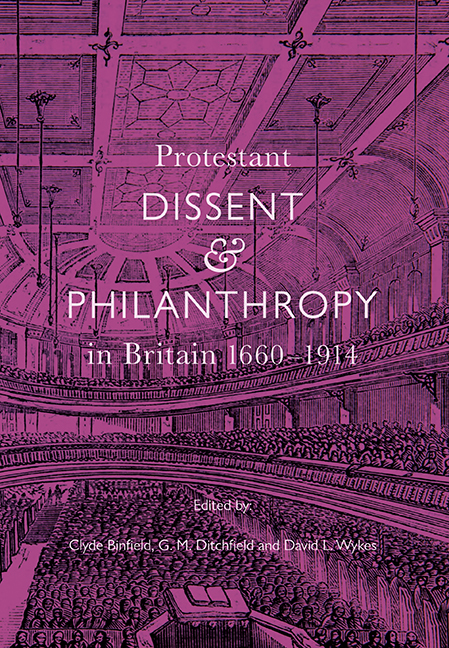Book contents
- Frontmatter
- Dedidcation
- Contents
- List of Illustrations and Tables
- List of Contributors
- Acknowledgements
- List of Abbreviations
- Introduction
- 1 Dissent and Charity, 1660–1720
- 2 Dissenters and Charity Sermons, c. 1700 to 1750
- 3 John Howard, Dissent and the Early Years of Philanthropy in Britain
- 4 Rational Philanthropy: Theory and Practice in the Emergence of British Unitarianism, c. 1750–1820
- 5 David Nasmith (1799–1839), Philanthropy Expressed as Campaigning
- 6 Building Philanthropy: The Example of Joshua Wilson (1795–1874)
- 7 Funding Faith: Early Victorian Wesleyan Philanthropy
- 8 Unitarians and Philanthropy After 1844: the Formation of a Denominational Identity
- 9 Children and Orphans: Some Nonconformist Responses to the Vulnerable in Victorian Britain
- 10 The Rowntree Family and the Evolution of Quaker Philanthropy, c. 1880 to c. 1920
- 11 ‘Not slothful in business’: Enriqueta Rylands and the John Rylands Library
- Select Bibliography
- Index
- STUDIES IN MODERN BRITISH RELIGIOUS HISTORY
Introduction
Published online by Cambridge University Press: 21 March 2020
- Frontmatter
- Dedidcation
- Contents
- List of Illustrations and Tables
- List of Contributors
- Acknowledgements
- List of Abbreviations
- Introduction
- 1 Dissent and Charity, 1660–1720
- 2 Dissenters and Charity Sermons, c. 1700 to 1750
- 3 John Howard, Dissent and the Early Years of Philanthropy in Britain
- 4 Rational Philanthropy: Theory and Practice in the Emergence of British Unitarianism, c. 1750–1820
- 5 David Nasmith (1799–1839), Philanthropy Expressed as Campaigning
- 6 Building Philanthropy: The Example of Joshua Wilson (1795–1874)
- 7 Funding Faith: Early Victorian Wesleyan Philanthropy
- 8 Unitarians and Philanthropy After 1844: the Formation of a Denominational Identity
- 9 Children and Orphans: Some Nonconformist Responses to the Vulnerable in Victorian Britain
- 10 The Rowntree Family and the Evolution of Quaker Philanthropy, c. 1880 to c. 1920
- 11 ‘Not slothful in business’: Enriqueta Rylands and the John Rylands Library
- Select Bibliography
- Index
- STUDIES IN MODERN BRITISH RELIGIOUS HISTORY
Summary
Dissent, charity and philanthropy: the current historiography
This volume examines the distinctive contribution made by Protestant Dissenters from the Church of England to the history and development of charity and philanthropy in Britain from 1660 to the beginning of the twentieth century. The key terms used in the volume will reflect the definitions made by the Unitarian minister Abraham Rees in his Universal Dictionary of Arts, Sciences, and Literature in 1819. Drawing upon Matthew xxii, 37–40, Rees defined charity as ‘one of the three grand theological virtues; consisting in the love of God and our neighbour’, implying altruism primarily in a personal or individual sense, although frequently involving financial generosity on a substantial scale. He defined philanthropy as ‘a general benevolence towards the species’, signifying a more organised, although nonetheless private and voluntary, method of alleviating hardship and, by implication, thereby contributing to the public good.
Religion has long been seen as a primary motivation for charity; indeed charity has formed a central part of Christian teaching from the earliest days. While the Church was the vehicle for providing much of the charity in the medieval period, historians see a decisive transformation in the fifteenth and sixteenth centuries in response to major economic, social and religious changes. The Protestant Reformation, together with the development of a capitalist economy in many parts of Europe and the rapid growth in numbers of the labouring poor, required new strategies for relieving poverty, not least in the role of the individual, which led to major changes in emphasis. Charity initiated and controlled by secular authorities increasingly supplemented the work of the Church. Historians more recently have labelled the benevolence of this earlier period as charity, and identified a major change in the late eighteenth century with the beginnings of ‘philanthropy’, the relief of human suffering, as something distinctive from ‘charity’. The first person to be recognised publicly as a philanthropist in England was the prison reformer John Howard, a member of the Congregational Church in Bedford, whose career is the subject of Hugh Cunningham's chapter in this volume (Chapter 3).
The history of charity and of philanthropy has attracted increasing scholarly interest in recent years. Over the last two decades there have been studies of changes in attitudes to poverty and its relief, health care, histories of specific charitable and philanthropic institutions, and of public provision through the poor law and, in more recent times, the welfare state. Recognition that charity played an important part in the lives of the English poor is now widely accepted.
- Type
- Chapter
- Information
- Publisher: Boydell & BrewerPrint publication year: 2020

